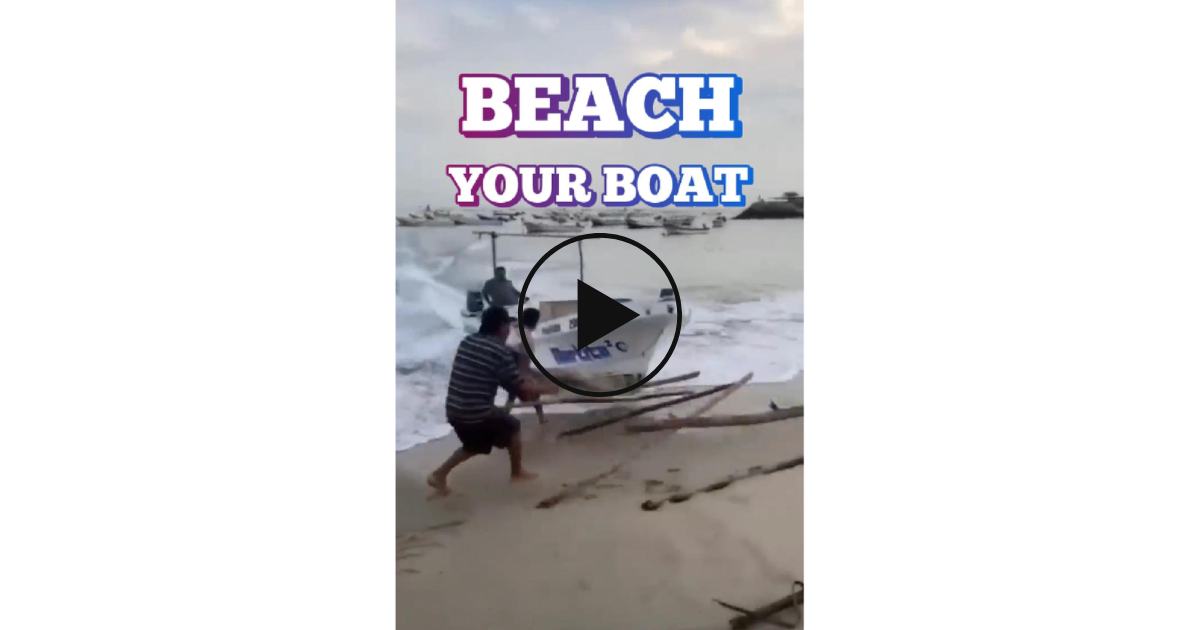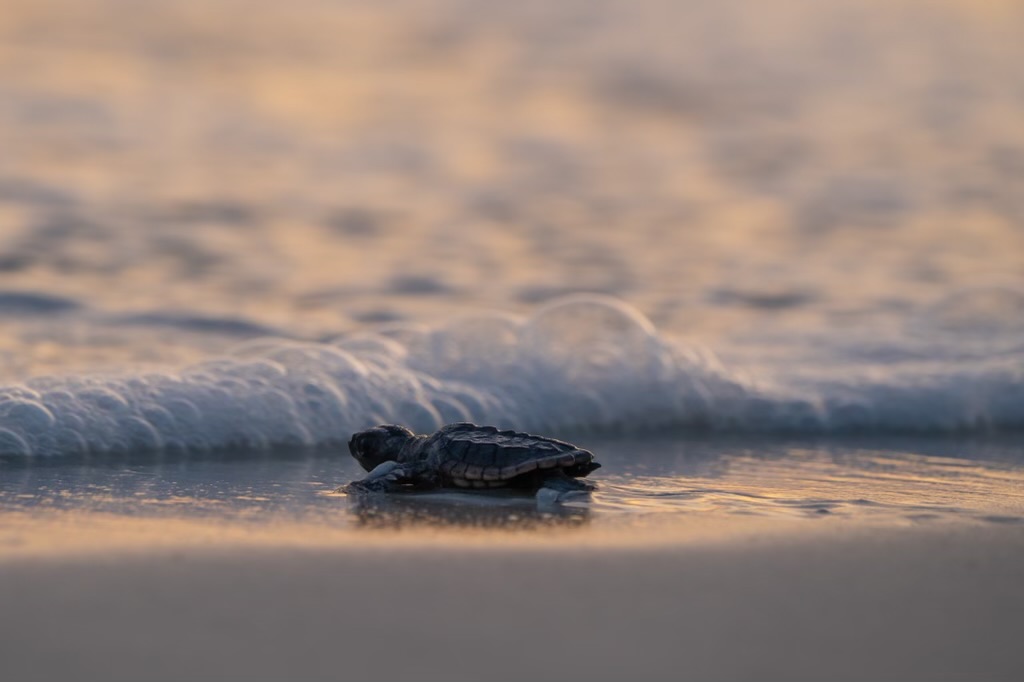Mote Marine Restoring Coral: Caribbean King Crabs to the Rescue
Mote Marine Laboratory has taken on the vital task of restoring Florida's coral reefs, which play a crucial role in maintaining ecosystems and coastal economies. One innovative approach they're employing involves Caribbean king crabs (Maguimithrax spinosissimus).
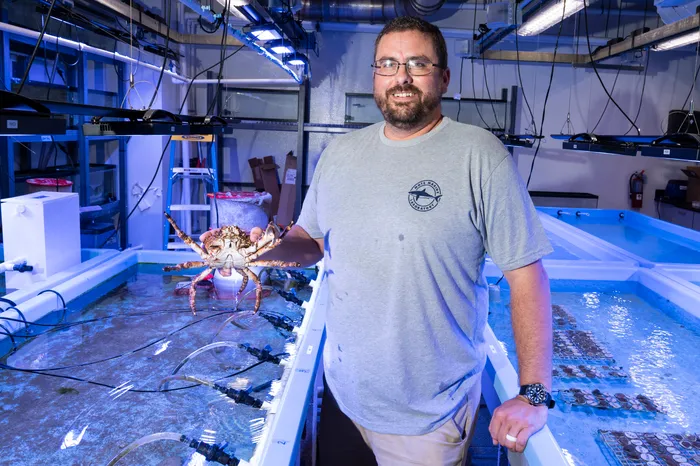
These large native herbivores are being raised at the newly opened Florida Coral Reef Restoration Crab Hatchery Research Center, which serves as the first fully operational Caribbean king crab hatchery of its kind. The crabs' natural algae-eating habits help improve habitat conditions for coral and other marine life, ultimately contributing to the overall success of restoration efforts.
In a collaborative effort with the National Oceanic and Atmospheric Administration (NOAA), Mote Marine Laboratory is working tirelessly to implement strategies that protect and restore Florida's coral reefs. The Mote's Aquaculture Research Park plays a significant role in this mission by hatching and rearing the Caribbean king crabs. Once mature, these crabs will be released onto restoration sites along Florida's coral reefs, where they will actively contribute to improving the health and resilience of these crucial ecosystems.
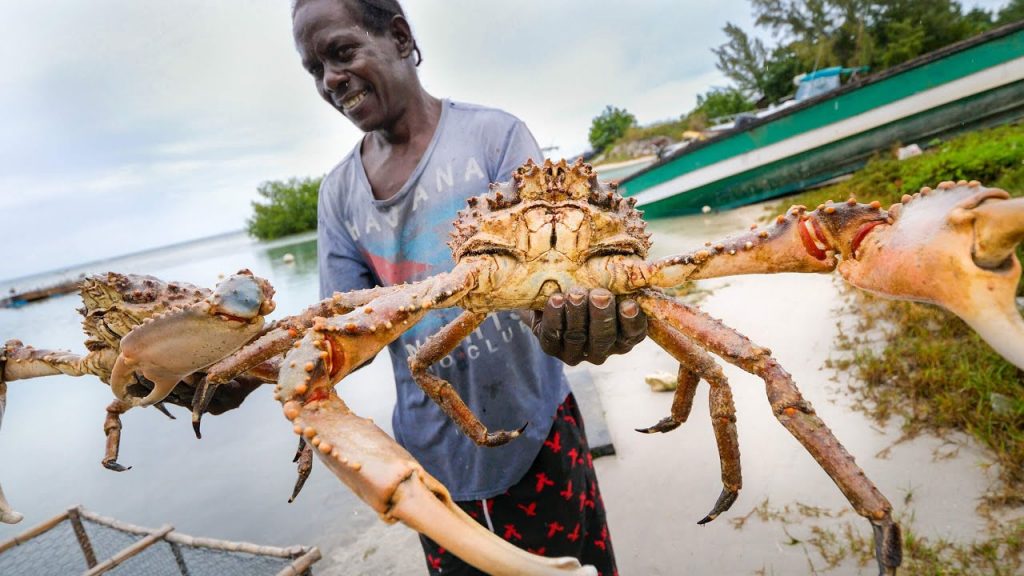
Key Takeaways
- Mote Marine Laboratory is focusing on restoring Florida's coral reefs using Caribbean king crabs.
- The first fully operational Caribbean king crab hatchery supports these restoration efforts.
- Collaboration with NOAA and the Mote's Aquaculture Research Park is crucial for the overall success of the project.
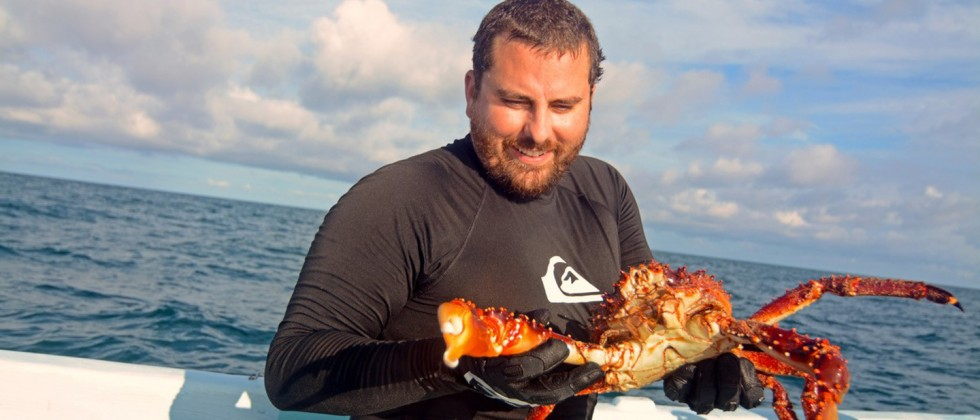
Mote Marine Laboratory and Its Mission
Mote Marine Laboratory is a leading marine science facility dedicated to marine research and education, focusing on the conservation and sustainable use of marine biodiversity, healthy habitats, and natural resources. Situated in the heart of the Lower Keys, only 24 miles from Key West, Mote's Elizabeth Moore International Center for Coral Reef Research & Restoration (IC2R3) is equipped to conduct cutting-edge research in the Florida Keys.
Under the leadership of Michael P. Crosby, Mote Marine Laboratory has been actively involved in various projects, including the Mission: Iconic Reefs initiative. This science-based approach aims to restore and revitalize Florida's degrading coral reefs. In collaboration with the National Marine Sanctuary Foundation and other partners, Mote's coral reef restoration program has successfully restored over 216,000 corals to Florida's Coral Reef since its inception.

Community involvement is at the core of Mote's efforts. By engaging various stakeholders, including local communities, businesses, and environmental organizations, Mote Marine Laboratory strives to ensure the success and sustainability of its coral restoration projects, as well as its other research programs. As part of its commitment to foster awareness and collaborative efforts, Mote's coastal policy programs help guide the responsible use and protection of coastal ecosystems and resources.
One of Mote's recent initiatives is the opening of the Florida Coral Reef Restoration Crab Hatchery Research Center in September 2023, which aims to restore Florida's coral reefs through innovative Caribbean king crab hatchery and research. In partnership with experts such as Kevin Claridge, Mote Marine Laboratory is confident in its ongoing efforts to preserve and revive marine ecosystems by leveraging scientific research, cutting-edge technology, and robust community engagement.

The Role of Caribbean King Crabs
Caribbean king crabs play a vital role in maintaining coral ecosystems by serving as a powerful herbivore in the world of reef herbivores. Their primary function is to keep the growth of algae in check, which helps to prevent seaweed dominance that can hinder coral recruitment. In turn, this supports a healthy reef fish diversity and ensures the overall well-being of coral ecosystems.
One of the main challenges faced by coral reefs is the overgrowth of algae. Excess algae can outcompete corals for sunlight and space, leading to a decline in corals and negatively impacting the entire ecosystem. Caribbean king crabs have a unique ability to prevent this by consuming large amounts of algae. Their strong claws and natural adaptability make them excellent algae-eaters, addressing the issue of algal overgrowth and enabling the continued growth and health of the corals.
Caribbean king crabs are not the only herbivores that play a part in protecting coral ecosystems. Other species, such as parrotfish and urchins, also contribute to keeping the reefs healthy. While parrotfish are mainly herbivorous, urchins are omnivorous, feeding on both plants and algae. However, due to the decline in these herbivore populations, the Caribbean king crab could be crucial in the effort to combat seaweed overgrowth and preserve coral reefs.
Mote Marine Laboratory has been working on raising and introducing Caribbean king crabs to Florida's Coral Reef since 2022. The establishment of the first fully operational Caribbean king crab hatchery in 2023 is an important step in utilizing these exceptional herbivores for coral restoration efforts. Through their research and intervention, Mote Marine Laboratory aims to enhance the role of Caribbean king crabs and similar herbivores, helping to maintain the delicate balance in coral ecosystems.
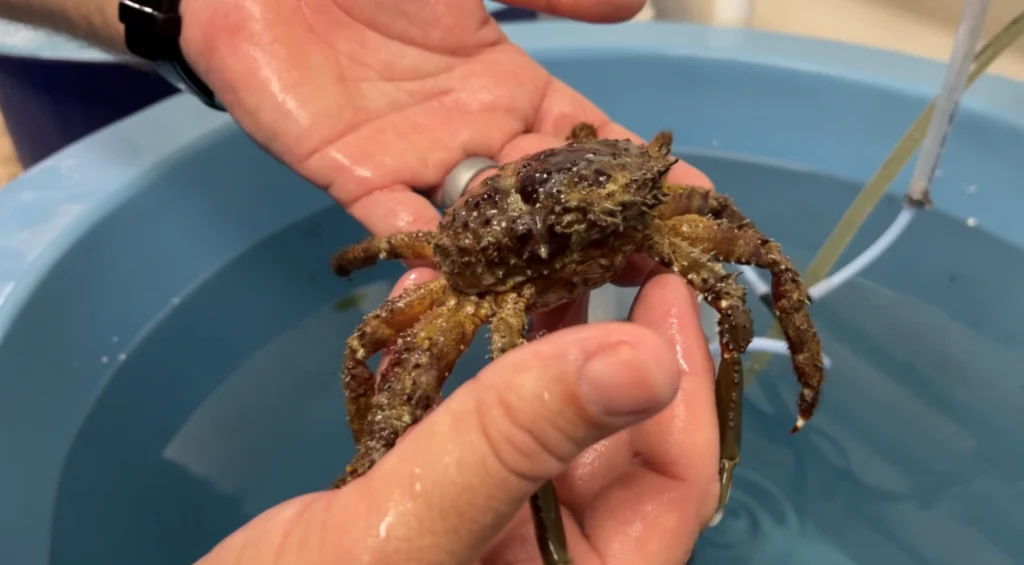
The Restoration Strategy
Mote Marine Laboratory has devised a unique method to restore Florida's coral reefs that involves the use of Caribbean king crabs. The crabs are known to consume algae and help maintain a healthier coral reef environment. In 2023, Mote opened the first fully operational Caribbean king crab hatchery to support their restoration initiatives.
The overall strategy to restore Florida's coral reefs is part of a larger effort called Mission: Iconic Reefs, which focuses on the restoration of seven crucial coral reef sites. By integrating Caribbean king crabs into this strategy, Mote aims to improve the health of the reefs and promote the recovery of coral populations.
Postdoctoral research fellows at Mote work closely with the hatchery's crab population to monitor health and reproduction. The success of the restoration efforts depends on the successful breeding and recruitment of these crabs, which, in turn, will help to control the overgrowth of harmful algae at the restoration sites.
The outcome of this unique restoration strategy will be determined by the overall improvement in coral health and the growth of new coral colonies. This approach aims to support Florida's coral reef ecosystem by reviving the delicate balance of life that is crucial for its long-term survival.
Mote Marine Laboratory's efforts to integrate Caribbean king crabs into their coral reef restoration strategy present a promising solution for the health and future of Florida's precious coral reefs. With continued research and development, this innovative approach may pave the way for effective coral reef conservation worldwide.
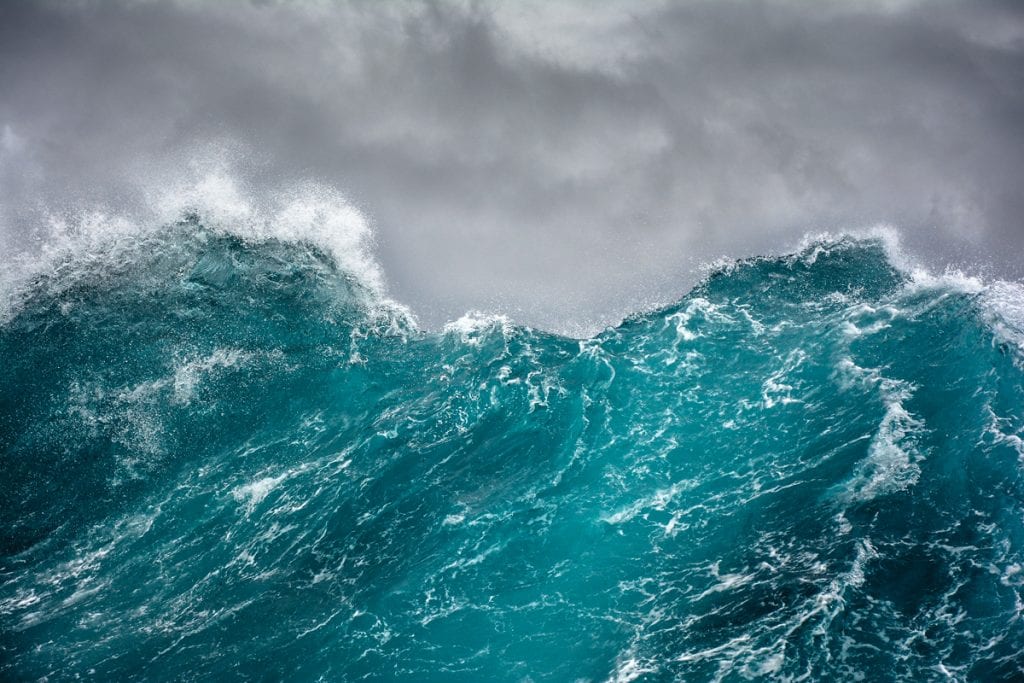
The Involvement of National Oceanic and Atmospheric Administration (NOAA)
The National Oceanic and Atmospheric Administration (NOAA) is a U.S. government agency that is dedicated to the study and preservation of Earth's natural resources, specifically focusing on the oceans, atmosphere, and coastal areas. Through various programs and initiatives, NOAA strives to protect and enhance the environment and the ecosystems it supports.
One such initiative is NOAA’s Mission: Iconic Reefs (M) capacity building grant program, designed to promote the restoration of coral reefs in the Caribbean region, with a focus on utilizing King Crabs to aid in this process. This program is a collaboration between NOAA and the National Marine Sanctuary Foundation, among other partners. The goal of the M program is to provide resources and support for organizations working to restore iconic coral reefs in the region, thereby fostering resilient ecosystems and economies.
Shannon Colbert, the Vice President of External Affairs at the National Marine Sanctuary Foundation, works closely with NOAA to develop and implement the M program. This collaboration is essential for ensuring that both governmental and non-governmental organizations are aligned in their efforts to restore and protect vital coral reef ecosystems.
The use of Caribbean King Crabs in the restoration efforts stems from their ability to consume harmful macroalgae that can hinder the growth and health of coral reefs. By introducing these crabs as a natural means of algae control, the M program hopes to create a more balanced and sustainable ecosystem that can support the growth of new coral and the overall well-being of the reef.
In conclusion, the National Oceanic and Atmospheric Administration (NOAA) is actively involved in the restoration of Caribbean coral reefs through the Mission: Iconic Reefs (M) capacity building grant program. Working alongside partners like the National Marine Sanctuary Foundation and its Vice President of External Affairs, Shannon Colbert, NOAA is making strides to ensure the long-term health and resilience of these important ecosystems.
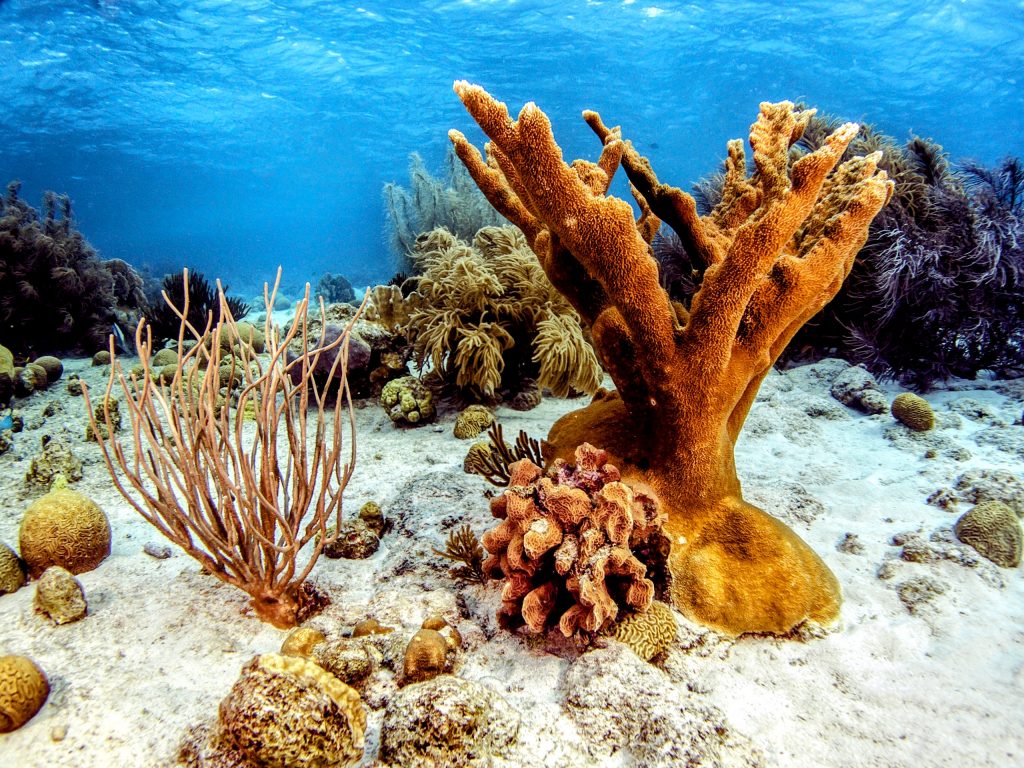
Protecting Florida’s Coral Reefs
Mote Marine Laboratory has taken significant steps to help restore and protect Florida's coral reefs, a valuable environmental and economic asset in the state. A key innovation in their efforts is the establishment of the first fully operational Caribbean king crab hatchery to help restore the reefs.
The hatchery aims to help reverse the damage caused by heat waves and disease that have put Florida's coral reefs in crisis. By introducing Caribbean king crabs to the ecosystem, the researchers hope these crabs can help control algae overgrowth and facilitate coral regrowth.
The Florida Coral Reef Restoration Crab Hatchery Research Center has received support from various state representatives, including State Senator Joe Gruters, State Representative Fiona McFarland, and U.S. Representative Steube. They recognize the importance of restoring Florida's coral reefs not only for environmental reasons but also as a crucial component of the local economy.
Located in Sarasota, FL, Mote Marine Laboratory has restored more than 216,000 corals to Florida's Coral Reef and has witnessed spawning events where restored corals participate in sexual reproduction, generating new generations of corals. This accomplishment demonstrates progress in the reef restoration efforts.
In conclusion, through initiatives like the Caribbean king crab hatchery and extensive coral restoration work, Mote Marine Laboratory continues to work diligently towards safeguarding and reviving the invaluable coral reefs in Florida. The collaboration with state representatives and researchers serves as a testament to the collective effort in preserving the ecological treasure for both environmental and economic benefits.
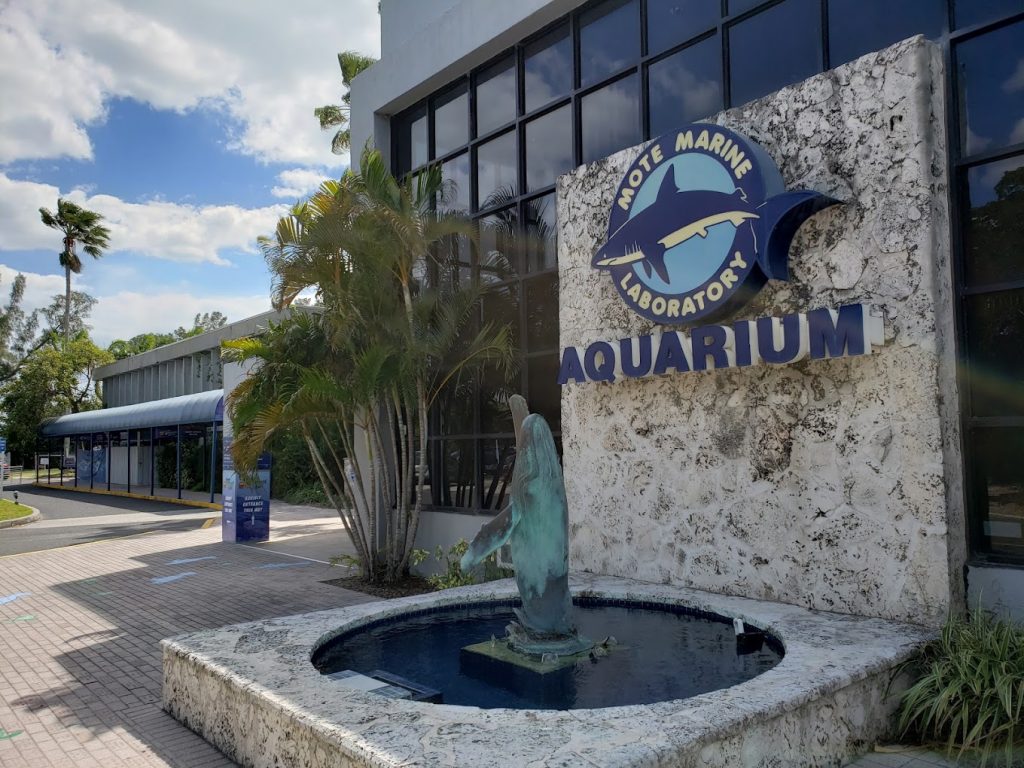
The Mote's Aquaculture Research Park and Its Function
Mote Marine Laboratory's Aquaculture Research Park in Sarasota, FL, serves as a vital component in their coral reef restoration efforts. The 200-acre research facility focuses on developing sustainable aquaculture systems to support the growth and study of various marine species, including corals and Caribbean king crabs.
The Coral Reef Restoration research program conducted at the Aquaculture Research Park aims to restore and maintain the health of coral reefs, with a focus on Florida's Coral Reef. As of 2020, Mote scientists have successfully restored over 216,000 corals, with some even engaging in sexual reproduction to produce new generations. This effort to repopulate the coral population is essential due to the unprecedented worldwide die-offs of corals.
The Marine & Freshwater Aquaculture research program, also conducted at the facility, works on developing environmentally responsible methods for cultivating marine and freshwater organisms. The research conducted here directly contributes to Mote's ongoing coral restoration project.
One essential aspect of the restoration process involves the use of Caribbean king crabs, a species native to the coral reefs. These baby crabs play a significant role in maintaining the health and integrity of coral structures, as they consume harmful algae that can negatively impact corals. To facilitate their use in the projects, Mote has expanded the production of Caribbean king crabs at its Aquaculture Research Park.
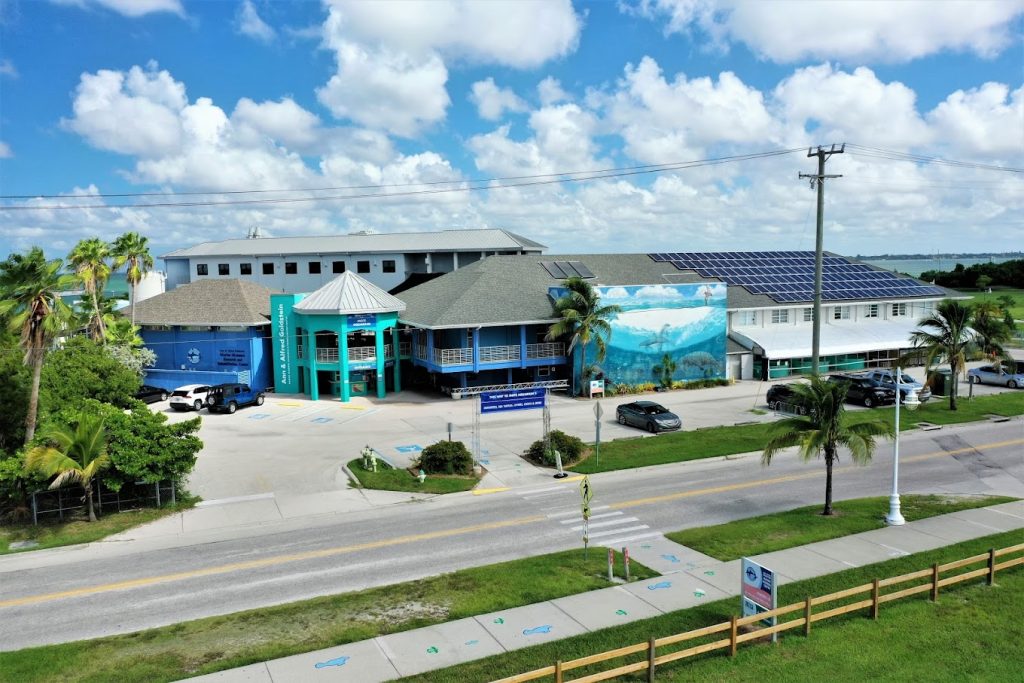
Funded by a nearly $7 million grant, Mote aims to produce and outplant 242,000 coral fragments and 34,000 Caribbean king crabs over a four-year project duration at ten different reef sites. Furthermore, the research carried out at the Aquaculture Research Park in Sarasota has extended to the Elizabeth Moore International Center for Coral Reef Research & Restoration in Summerland Key, Florida.
In summary, the Aquaculture Research Park plays a crucial role in Mote Marine Laboratory's diverse research programs, focusing on coral reef restoration and sustainable aquaculture systems. By cultivating a healthy coral ecosystem and employing Caribbean king crabs as natural allies in maintaining the reefs, Mote's efforts are sure to make a positive impact on the future of coral reefs.
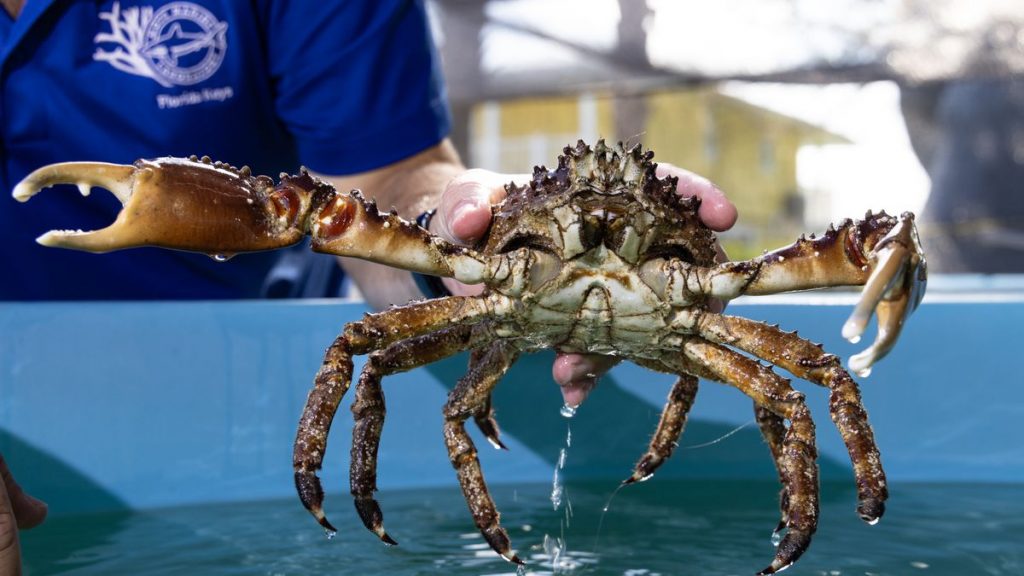
Utilizing Caribbean King Crab in Restoration
Mote Marine Laboratory has been focusing on utilizing the Caribbean king crab as a vital part of their coral restoration efforts. These crabs are known for their ability to control algal growth, which can negatively impact coral ecosystems.
The production and survival of Caribbean king crabs are key factors in Mote's research, as their efforts include breeding and raising them to ensure a sustainable population that can contribute significantly to improving coral health. This has led to the establishment of a Caribbean king crab hatchery at Mote Marine Laboratory, which aims to increase the crabs’ numbers in support of their coral restoration mission.
Under the guidance of Coral Reef Restoration Research Program Manager Dr. Jason Spadaro, researchers at Mote Marine Laboratory have been examining different aspects of Caribbean king crab biology, including growth, survival, and disease resistance. It is crucial to understand these factors to develop effective restoration strategies and enhance the crabs’ ability to aid in coral recruitment and restoration.
Another significant aspect of the research conducted by Dr. Spadaro and his team involves coral restoration at the Elizabeth Moore International Center for Coral Reef Research & Restoration. They work to improve coral ecosystems' resiliency by incorporating Caribbean king crabs as natural cleaners. These crabs help maintain a healthy balance between algal growth and coral communities.
Through these efforts, juvenile crabs that are bred and raised at the King Crab Hatchery are introduced into the coral ecosystems, providing an increased chance of growth and survival. This method has demonstrated promising results, with the crabs showing a positive impact on coral restoration research and the overall health of coral reefs.
In conclusion, Mote Marine Laboratory's incorporation of Caribbean king crabs in their coral restoration work shows great potential. By understanding and encouraging the role these crabs play in maintaining healthy coral ecosystems, researchers can significantly contribute to the restoration and preservation of these invaluable natural resources.
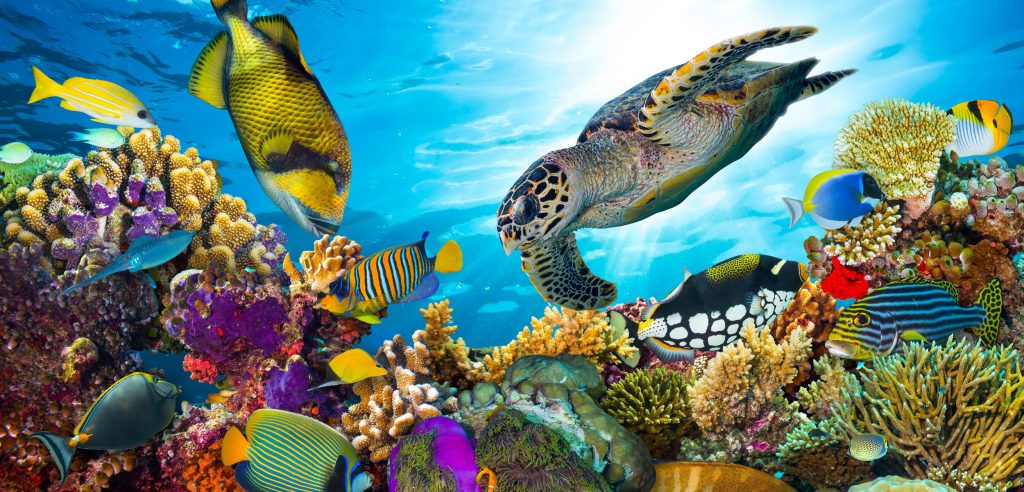
Future Directions and Challenges
Caribbean king crabs are considered a promising solution to help restore Florida's coral reefs, which have been severely impacted by algal overgrowth, bleaching events, and other environmental stressors. These herbivorous crabs are known for their ability to consume algae that can smother coral, thus playing a crucial role in maintaining the health and vitality of coral ecosystems source.
However, there are several challenges that must be addressed in order to successfully implement this restoration strategy. One such challenge is ensuring that the crabs are able to reproduce and thrive in their new environments. In response to this need, Mote Marine Laboratory has recently opened a Caribbean king crab hatchery to facilitate the successful breeding and distribution of these crabs.
Human effects on coral reef ecosystems are another major challenge to consider in this restoration effort. Pollution, habitat destruction, and overfishing can all have devastating impacts on coral health. Establishing clear guidelines and regulations to minimize human-caused disturbances to these ecosystems will be crucial in achieving a sustainable equilibrium.
Additionally, the future of coral reef restoration will likely require a combination of various strategies and techniques to be most effective. Although the introduction of Caribbean king crabs provides a promising tool for addressing algal overgrowth, it must be paired with other methods, such as planting new corals, restoring fish populations, and controlling invasive species, to create a comprehensive approach.
Lastly, more research is needed to better understand the potential long-term risks and benefits of introducing Caribbean king crabs to Florida's coral reefs. While initial studies have shown promising results, it is essential to monitor their ecological impact and continue evaluating their effectiveness in combating environmental stressors such as bleaching events.
In conclusion, the use of Caribbean king crabs as a restoration tool holds promise but faces several challenges. A holistic approach that combines various techniques, ongoing research, and strategic planning will be necessary to successfully restore the health and balance of Florida's coral reef ecosystems.

Frequently Asked Questions
How do Caribbean king crabs contribute to coral restoration?
Caribbean king crabs play a significant role in coral restoration by consuming algae that can hinder the growth of coral reefs. The crabs help maintain a balanced ecosystem by reducing the amount of algae on reefs, providing better conditions for coral to grow and thrive. Studies have shown that crab-filled reefs had about 85 percent less algae compared to those without crabs.
What are some common approaches to coral reef restoration in the Caribbean and Florida Keys?
Coral reef restoration approaches in the Caribbean and Florida Keys typically involve the propagation of genetically resilient corals and transplantation onto degraded reefs. Mote Marine Laboratory is actively engaged in such restoration efforts using innovative science-based techniques to restore reefs at sites like Eastern Dry Rocks.
Which predators pose a threat to king crabs?
Predators that pose a threat to Caribbean king crabs include larger fish and octopuses. These predators can limit the success of using king crabs in coral restoration efforts. Thus, it is crucial to consider the local ecosystems when introducing king crabs for algae control to help protect them from predation.
What's the record size for a captured king crab?
The record size for a captured king crab is not readily available. However, king crabs can grow to impressive sizes, with some species reaching up to six feet across when their legs are fully extended. The size of the Caribbean king crab varies depending on the species and environmental conditions in their habitat.
How does Mote Marine collaborate with other organizations for coral restoration?
Mote Marine Laboratory collaborates with various organizations, including government agencies, non-profit organizations, and academic institutions, to conduct coral restoration work throughout the Caribbean and Florida Keys. By partnering with these organizations, Mote Marine can leverage their expertise and resources to restore damaged coral reefs on a larger scale.
What are the long-term benefits of using king crabs in reef restoration efforts?
Using king crabs in reef restoration efforts contributes to long-term benefits by helping maintain a balanced ecosystem and promoting coral growth. As the crabs continue to regulate algae populations, they provide an ongoing, natural solution for enhancing coral recovery. In turn, healthier coral reefs benefit marine life and coastal communities that depend on these ecosystems for their livelihoods, tourism, and protection from storms.
Charlie is Editor-in-Chief of Sea Magazine


